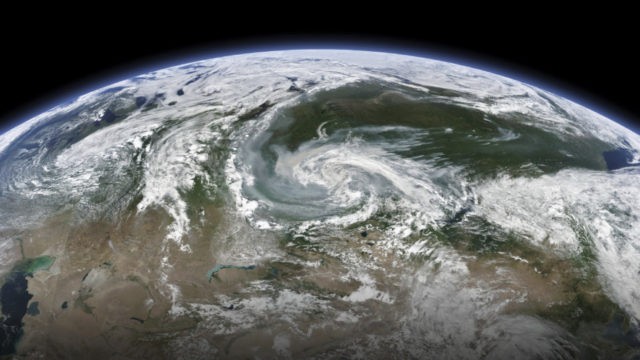Evidence is mounting that “tipping points in the Earth system” because of climate change could be more likely than was thought, “potentially committing the world to long-term irreversible changes,” warns a fascinating new article in Nature.
“In our view,” assert the article’s 7 authors, “the consideration of tipping points helps to define that we are in a climate emergency and strengthens this year’s chorus of calls for urgent climate action — from schoolchildren to scientists, cities and countries.”
Warming “must be limited to 1.5 °C,” even if this requires higher costs to society,” they declare, because this “requires an emergency response.”
In their latest effort to scare the world into taking drastic action to reduce greenhouse gas emissions, the authors propose a possibly devastating intersection of climate tipping points that could result in “abrupt and irreversible climate changes,” insisting that the very nature of this possibility is “too risky to bet against.”
The writers are careful to couch their prophecies in the conditional tense, never asserting that a given disaster will happen, but always that it could happen. Nonetheless, they believe that by painting a dire enough picture of what could happen, people will realize that the potential loss would be unsustainable and thus be moved to make great sacrifices to avoid it.
Anyone who has followed the climate change debate is familiar with the nature of such tipping points, which include ice collapse (which the authors recognize has “occurred repeatedly in the past”) and various “biosphere boundaries” (such as coral bleaching, permafrost thaw, and “ocean heatwaves”).
(As an aside, one cannot help wondering how something that has occurred “repeatedly” in the past can be called irreversible, but such is the nature of climate change rhetoric.)
“In our view, the clearest emergency would be if we were approaching a global cascade of tipping points that led to a new, less habitable, ‘hothouse’ climate state,” the authors warn, while arguing that that cascading effects “might” be common.
“Some scientists counter that the possibility of global tipping remains highly speculative,” the authors acknowledge. “It is our position that, given its huge impact and irreversible nature, any serious risk assessment must consider the evidence, however limited our understanding might still be. To err on the side of danger is not a responsible option.”
In other words, since apocalyptic scenarios of global chaos and destruction are not unthinkable but “might” happen if things go really badly, people should radically alter their lifestyles in a way that possibly could keep such calamities from occurring.
The authors do not say, of course, that such outcomes are certain, or even that they are probable, but only that they are possible — something everyone can no doubt agree on.
It is also possible that aliens will invade the earth unless every man, woman, and child puts on a tinfoil hat to frighten them away. Since this eventuality is unimaginably horrifying — one might argue, using the authors’ logic — perhaps we should play it safe and start making hats.
“If damaging tipping cascades can occur and a global tipping point cannot be ruled out, then this is an existential threat to civilization,” the writers contend. “No amount of economic cost-benefit analysis is going to help us. We need to change our approach to the climate problem.”
“In our view, the evidence from tipping points alone suggests that we are in a state of planetary emergency,” they declare, because “both the risk and urgency of the situation are acute.”

COMMENTS
Please let us know if you're having issues with commenting.